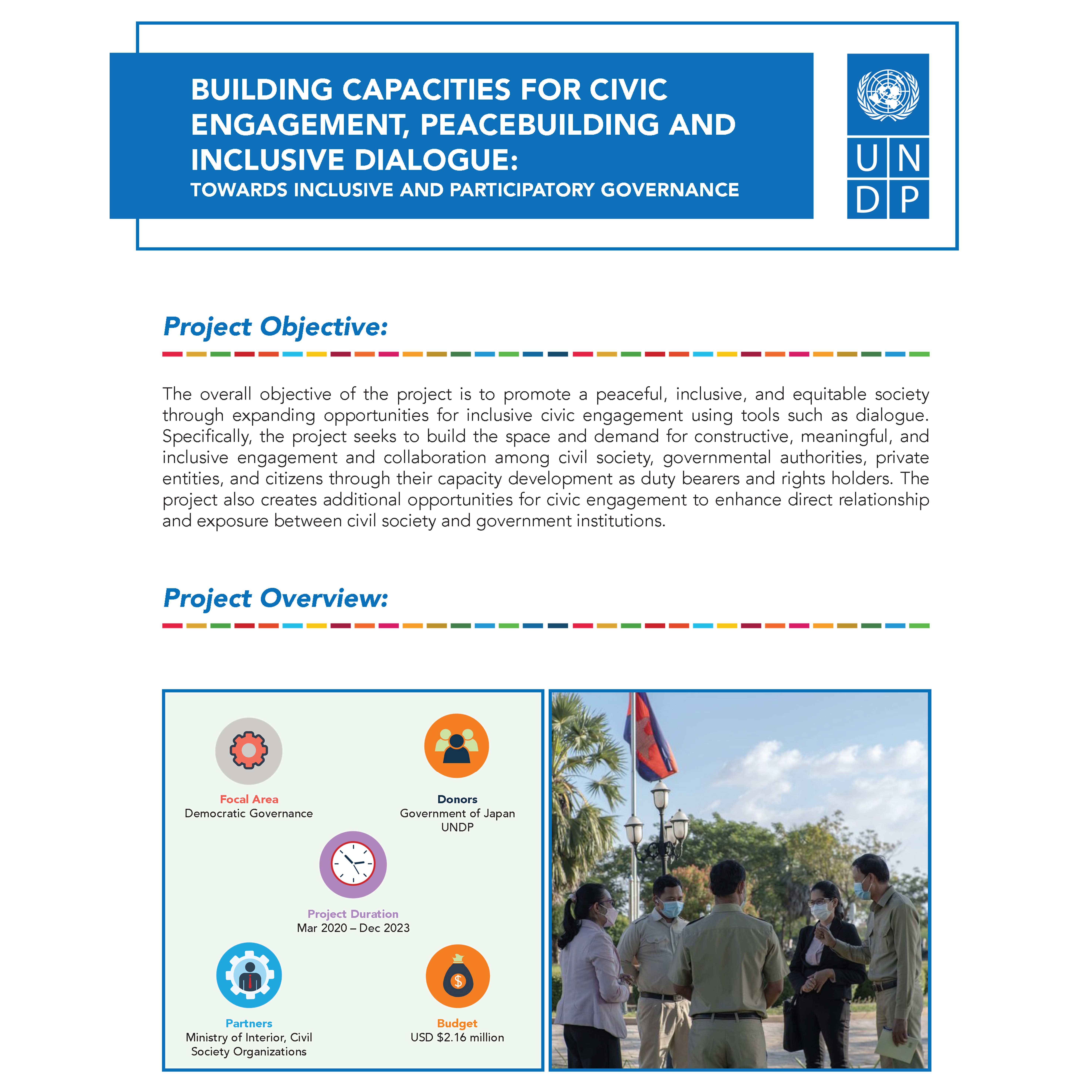Building Capacities for Civic Engagement, Peacebuilding and Inclusive Dialogue: Towards Inclusive and Participatory Governance
Project Background
The overall objective of the project is to promote a peaceful, inclusive, and equitable society through expanding opportunities for inclusive civic engagement using tools such as dialogue. Specifically, the project seeks to build the space and demand for constructive, meaningful, and inclusive engagement and collaboration among civil society, governmental authorities, private entities, and citizens through their capacity development as duty bearers and rights holders. The project also creates additional opportunities for civic engagement to enhance direct relationship and exposure between civil society and government institutions.
The Civic Engagement project start date was 1 March 2020 and the end date is 28 February 2024.
Expected Results
By 2023, women and men, including those underrepresented, marginalized, and vulnerable, benefit from more transparent and accountable legislative and governance frameworks that ensure meaningful and informed participation in economic and social development and political processes.
The project contributes to the outcome with the following three project outputs and in recognizing different voices of men and women, with particular attention to marginalized groups.
Output 1: CSOs and governmental authorities will be able to engage each other better in responding to citizens’ interests and in recognizing different voices of men and women, with particular attention to marginalized groups.
- 1.1 Develop capacity of civil servants both in relevant ministries and sub-national authorities
- 1.2 Develop capacity of CSOs
- 1.3 Develop tools and knowledge to understand male and female citizens’ interests, particularly marginalized groups’ interests
Output 2: Existing infrastructure for civic engagement (mechanisms, processes, and policies) will be more constructive, and open to diverse opinions in ensuring women’s participation
- 2.1 Improve engagement modality
- 2.3 Develop communications products and knowledge management
Output 3: Partnership among citizens, CSOs and government institutions (both national and sub-national) will be strengthened through identifying more benefits of civic engagement.
- 3.1 Organize innovation challenge on civic engagement
- 3.2 Organize study tours
Achievements to date (as of December 2022)
• Co-design processes of improving the Provincial Partnership Dialogue (PPD) supported in four provinces, i.e. Kampot, Kampong Cham, Ratanakiri and Siem Reap. Through the processes, the two provinces drafted the administrative decision how to set the agenda and implement PPD jointly between the Provincial administrations and CSOs.
• A certificate programme on Innovation for Local Administration was developed with the National School of Local Administration (NASLA). The training materials and facilitator’s guideline were developed and coaching sessions to NASLA trainers will complete in April 2023.
• Eight concepts were identified through a call for proposals on CSO sustainability in partnership with the Cooperation Committee for Cambodia (CCC). The Grant for CSO Sustainability will be provided to enhance CSO financial viability and sectoral infrastructure. The focus of the CSO Sustainability Grant was identified through civil society ecosystem mapping.
• Participatory research, facilitated by the Women’s Peace Makers using listening as a tool to understand different perspectives identified five common themes/interest areas by CSO and the government, which informs as entry points for the project to explore civic engagement.
• A social cohesion report in contextualizing in Cambodia with the measurement modelling was developed in partnership with the Future Forum. Young Cambodian researchers also shared their perspective on social cohesion by linking various day-to-day issues.
Grievance Redress Mechanism
Any person or community potentially affected by this project may file a request for a response from the project-based stakeholder response mechanism. The request to the project-based stakeholder response mechanism must relate to this UNDP project ‘Building Capacities for Civic Engagement, Peacebuilding and Inclusive Dialogue: Towards Inclusive and Participatory Governance’ and a possible environmental or social impact. Project Contact Details to submit grievances:
By phone during the office opening hours from 8am to 5pm from Monday to Friday):
o Civic Engagement Technical Coordinator: +855 23 216 167 / 214 371(ext. 1233)
o Programme Analyst: +855 23 216 167 / 214 371(ext. 1213)
By fax: +855 23 216 257 / 721 042
By email: mailto:project-concerns.kh@undp.org
By Facebook messenger link: http://m.me/undpcambodia
By Post: UNDP Cambodia Country Office
#53, Pasteur Street, Boeung Keng Kang I
P.O. Box 877, Phnom Penh, Cambodia
In case of email, fax or mail, please note that there are no strict format or language requirements. It is helpful if the complaint includes the following information:
• Name, address, telephone number, and other contact information.
• Whether the Complainant(s) wish to keep their identity confidential, and if so, why.
• How the Complainants believe they have been, or are likely to be, adversely affected by the project.
• If a third party, such as a civil society organization, is filing a complaint on behalf of an affected individual or community, the complaint should include evidence the third party is working on behalf of the individual or community.
• Although helpful, it is not necessary to cite to specific UNDP standards or policies (such as the UNDP's Social and Environmental Standards).
If a person or community has a concern about the ability of the UNDP Cambodia to respond fairly and effectively to the request, they have the option to file the request directly with the Stakeholder Response Mechanism at UNDP Headquarters in New York. Requests can be sent to UNDP Accountability Mechanism Web complaint portal (www.undp.org/secu-srm), or through the mail (project.concerns@undp.org; or stakeholder.response@undp.org; or secuhotline@undp.org in any language).
Social Cohesion Reports
Project Brief

 Locations
Locations













